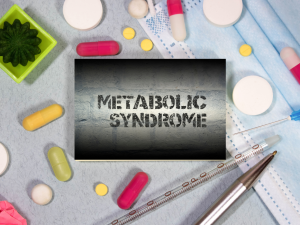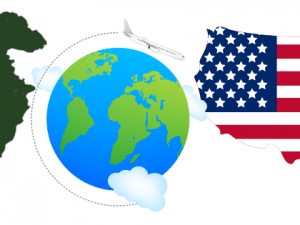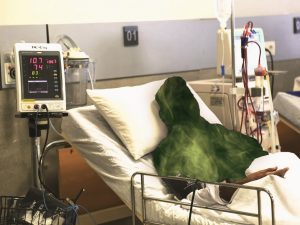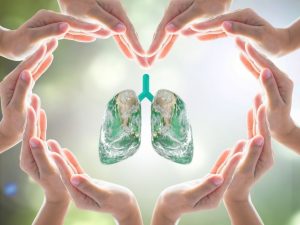One summer morning, when I had just started the third year of medical school, a friend called me and asked for help. After preliminaries were over, he told me about his kidney stones, a problem he had been dealing with for many years, but now that his friend has become a budding doctor in a big hospital, it occurred to him to be checked out and rid of these mini-monsters. His appealing tone and flattering words got the better of me, and I could do nothing but to invite him. A few days later, he showed up on my apartment door, with a smile that glittered through his dusty features from travel, a backpack on the right shoulder, and a suitcase beside him, suggesting that he was not going anywhere until his stones were cured. His left hand rested on his left flank, squeezing it tightly. The next day, we went to the hospital where the doctors and the departments, routines, and rituals, were still as new to me as to my friend. Anyways, we started on a journey that would change my life.
Crossing the hallways filled with the smell of povidone, sweat, and sickness, struggling our way through a crowd, we reached the reception and secured our slip, our ticket to a doctor. I was a familiar face to the seniors in the internal medicine OPD (outpatient department), and we moved in and out of the examination room smoothly. The professor recommended an ultrasound of the kidneys, and we happily strolled along the hallways toward the radiology department, expecting a similarly warm welcome. However, things turned out to be different.
My friend’s hand still on his left flank, we first went to the office of the most junior radiologist, who immediately recognized us—a medical student with a poor distant relative, here for a free tune-up. Without using words, he pointed his probe toward a piece of paper nailed to a board next to him, his list of patients for the day. No words were needed, of course. We moved on to the next door, as I was advised by the seniors whom I had consulted before starting this perilous path. We tried the office next door, where a senior registrar was continually moving his eyes from probe to screen and screen to probe. He didn’t even bother to look at us and, with a wave of his ponderous probe, dismissed us.
Donec Massa Integer
The face of my friend became long and sad. A smile that had appeared on his lips after our earlier success now disappeared. His shoulders slumped. He didn’t say anything, but you could read the disappointment in his flat features. For one last try, I looked around and noticed another office with no crowd outside. The doorkeeper was nice and let us in without much hassle. I walked into the room on my tiptoe and stood leaning against the wall, waiting silently. During the procedure, this radiologist and his VIP patient kept up an interesting chat loaded with loud laughter. However, when he noticed my apparition in the dimly lit room, his attitude abruptly changed, and he started shouting at me. As I took to my heels, he followed me outside the office and asked his poor doorkeeper, “How the hell he entered the room.”
Presently, I found myself in the middle of the hallway, standing amidst a big crowd, feeling myself to be at the center of the universe. The stare of the surrounding people seemed so powerful that it felt like I had been anchored to the spot for stoning. The soft humming of the crowd soared to an unbearable noise; the dim lights of the hallway now shone like sharp needles into my eyes. My stethoscope tightened around my neck. My throat started to parched; my breathing became heavy. Such an embarrassment came over me that I wished my white coat were my shroud. Occupied with my own troubles, I had forgotten my partner, until he put his left arm, hitherto holding his left flank, around my waist just when my legs were going to give out under the burden of the insult. With a pang of guilt in his eyes, as if taking the blame for this episode, he held my arm and pulled me away. The moment I moved out of that cursed spot, the embarrassment seemed to subside, and a feeling of anger overcame me. The blood in my veins seemed to be boiling with fury. I could feel the heat emanating from my skin.
“I want to smash his head into pieces and raze the building to the ground,” I said to my friend, adding, “what is the point of such a system that shows neither respect to a doctor nor mercy to a patient.”
He kept consoling me, “take it easy, take it easy. We will see a private doctor.”
We were amidst this argument when someone came behind us and tapped on my shoulder. Turning around, I saw the same doorkeeper who had been kind enough to let us enter that ominous office. My apology was still on my lips when he cut me short and advised me to see the head of the radiology department, whom he mentioned with venerable words.
Upon entering that office, we noticed two senior staff sitting around a tea table and chatting. There was something unusual about our savior from the beginning. For one thing, he had no frown on his face, which I had believed to be of a must-have for a doctor. For another thing, he smiled when he spoke, again an absolute novelty in that building. Lastly, he listened. Having listened to me, he put down his cup, took leave of his partner, with the promise of being back soon to join him for the prayer, and signaled us to follow him. He took us to his office and, after adjusting the bedsheet and machine, called the patient to lie down. The procedure started. Sliding the probe on the patient’s belly, flank, back, he kept moving his face between my friend, me, and the screen. He guided the patient through the procedure and reassured him regarding his stones. To me, he showed respect and admiration, praising my action of helping a patient, a friend, and, more importantly, a friend in need. Watching him doing his work, listening to his words, I felt my anger melting away. Soon, I found myself laughing with the other two. All my fury faded as if the magic of his presence and words had erased my memory. I woke up from this reverie only when the professor announced that the procedure was over. When we left the room, my friend’s hand was still on his left flank, but my world had changed.
That day I realized how our planet still stands intact despite so much misery, brutality, and abuse. It is because of a few good people. The mundane majority may seem to sway us their way, but these towers of the light signal us to the right path. With a single, sweeping act, they disperse the doubt and dismay that have gradually got hold of us. An encounter with such saints leaves a permanent imprint on our soul. It is not a school that shapes our character but a good teacher; not community, but a model leader. Like childhood friends, they remind us that no bully can destroy our day, as long as they stand beside us. In a world that seems to go down and down, they show us how to live on. When cheating and corruption becomes a norm, they surprise us with their outmaneuvering of the tradition. These divine figures form no group or class, write not books or treatise. They are out there among us and make our world a habitable place just with their presence, words, and works.
All these years, I have strived to be a doctor like him, keeping my doors open to all those who come for help—patients, residents, students, or anyone else—ready to help someone in need, hoping to repay that sage physician who served us without screening our status, who dedicated his private moments to relieve our pain, asked of us neither money nor thanks nor favor. That is what I feel I owe him, at least.





